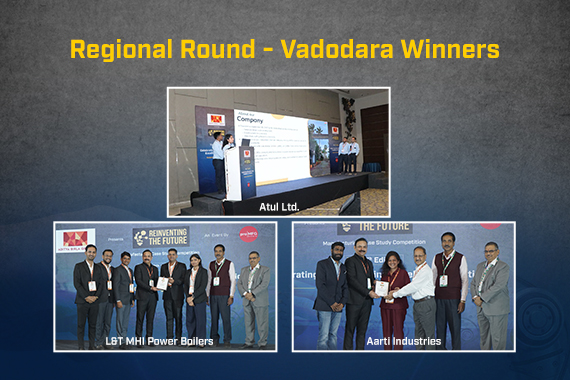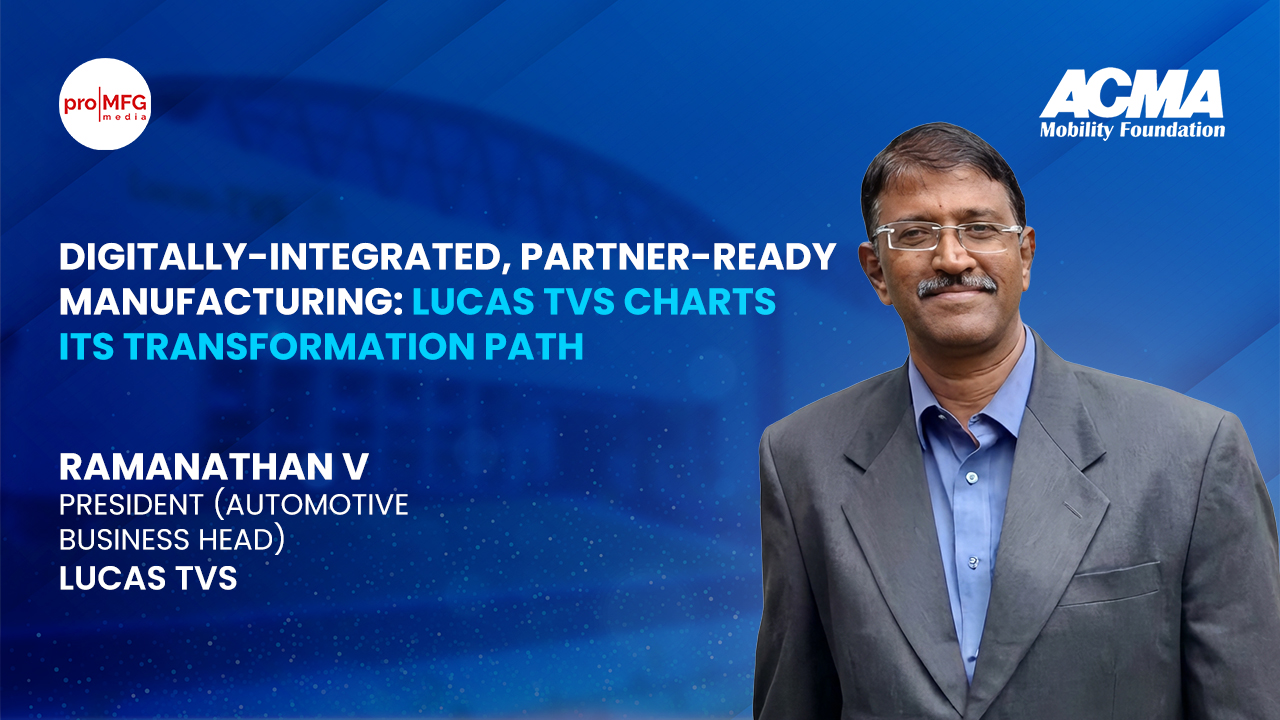“We are really excited about the manufacturing sector’s future and how Kennametal can help each one of our customers to grow in this journey and help the country in its growth because everything that we do is to build how the country is going to grow and that’s what our focus is.”
May 2024 : In continuation of our newly launched series – Boss Talks, Niranjan Mudholkar, Editorial Director, Pro MFG Media, speaks with Vijaykrishnan Venkatesan, Managing Director, Kennametal India. Mr. Venkatesan discusses his passion for manufacturing and how Kennametal India contributes to the country’s growth. He also talks about the future of metal cutting and how Kennametal India is using technology to improve its products and services. He is driven by a desire to contribute to the growth of Kennametal and India’s manufacturing sector. Highlighting the fact that Kennametal India has been a partner to Indian manufacturers for over 60 years, Mr. Venkatesan sees the metal cutting sector as playing a vital role in India’s ambitions to become a global manufacturing powerhouse.
You are leading an organisation like Kennametal. So, what drives you for this? Is it your love for metal cutting? Is it your love for manufacturing? What exactly is it that drives you as a leader?
Very good question, not something which I get usually, at least not in an interview. What drives me predominantly is how we contribute, both in terms of fundamental growth in the country and also how we can play a part in building this nation. Because if you look at our products, we are a company which has been here for the last 60 years. Incorporated in 1964, we have been partnering with all the manufacturing companies since then. Today, with the manufacturing sector growth, and the kind of solutions that we offer, we feel that we bring in a lot of engineering solutions to solve problems that our customers face in terms of building. For example, we participate right from making aircraft parts to passenger vehicles to two-wheelers, to wind turbines, to gas turbines, to mining. So, you name an industry and we are present there. What we do is, we play behind the scenes. So, most of our products are going into these industries, and we help our customers achieve what they want. And that impact is very satisfying in being a part in the journey of the country’s growth, just not in the last few years, but also the exciting time that we are living today and the future!
As you very rightly said, India is going through very exciting times, we are evolving into what we can call probably as a global economic powerhouse. And the manufacturing industry, of course, is playing a big role in this. So how do you see the metal cutting sector, in particular playing the role in pushing India's dreams of becoming a global manufacturing powerhouse?
Firstly, the domestic consumption of the country itself will grow rapidly. Now, if the economy is going to grow from roughly let’s say US$3.8 trillion to US$10 trillion at some point in time, manufacturing will play a significant role in that growth. Now, when manufacturing grows, let’s say it’s purely driven by domestic consumption, India will be the third largest economy. and the scale is going to be very different for manufacturing operations. Whenever there is a machining requirement, our products are used. We drive productivity, we drive better finish and we bring better technology on how our customers’ finished products. Let’s say you want to build an aircraft, you want to build a train, you want to build a commercial vehicle, you want to build a large turbine or let’s say you want to do coal mining. We are there in each of these industries and we are seeing this as an exciting journey. We are really excited about the manufacturing sector’s future and how Kennametal can help each one of our customers to grow in this journey and help the country in its growth because everything that we do is to build how the country is going to grow and that’s what our focus is.
Your Metal cutting segment offers an array of milling, turning, hole-making, threading, and tooling systems products through two brands – Kennametal and WIDIA. How are these two brands growing individually in terms of business?
Both brands are doing well. So, while the two brands bring in very similar sorts of solutions in terms of tooling, the Kennametal brand is what we call a total solutions brand - a full solution provider. What we have been witnessing is that both brands have been growing very nicely because both the markets are growing very well. If you want to make, let’s say an EV solution, or you are talking about an aerospace component, or you are talking about a medical component, no matter what, we are very well positioned to serve all these sectors. So, we are happy to push both the products in the market and our customers are very happy using both these products.
Transportation, general engineering and aerospace have been the big customer segments for Kennametal India. Which are the other industry sectors that contribute to your business?
If you look at India, all of these sectors are growing. Transportation is growing, aerospace is growing, wind energy is growing. But there are also a lot of other sectors which are coming up. The Railways sector is very, very interesting because of the kind of investment what the country is making. We are seeing a significant surge in electronics manufacturing; electronics manufacturing uses a lot of tooling. So, that gets very interesting. Then you look at areas like construction equipment, India is going to be the third largest construction equipment industry in the world and most of it is being made in India. This is again a high-speed growth sector for us. So, if I look at some of these large sectors, while our traditional sectors of transportation, aerospace energy, general engineering will grow, we are also seeing a significant acceleration in areas like railways, electronics and construction equipment industries.
The E-mobility sector is experiencing enormous and quick momentum in India. How is it impacting the cutting tools industry? How do you see the cutting tools industry adapting to the evolving industry scenario?
With EVs, what has changed is the engine. But you still need a shock absorber, you still need a gearbox. So, application wise, it’s still machining because it still comes as a metal. Thanks to our Global Technology and R&D efforts, we have kept pace with all the EV transition, material changes and all that. So, we have been able to supply to our customers in the US, in Europe and in India or in China. When it comes to EV manufacturing, we have been very conscious about tracking the changes which are happening. We are exploring what new machining needs are there. If the material changes, then what kind of solutions one needs to give and if the weight has to be reduced, what needs to be done. So, there is a lot of engineering design and R&D work that has happened to make sure that we are ahead of the curve when it comes to EVs, and also support our customers. Because if you look at who makes EVs, except a few brands, most operators are the traditional brands with whom we have operated for decades and decades through the internal combustion engine. So, what we do is we work with the customers and they come back and tell us that we are making this. We work with the customers at the initial stages of a project stage, and then we evolve the solutions.
The Indian manufacturing industry has been making rapid strides in the adoption of digitalization. How is Kennametal India facilitating and enabling this adoption from the machining point of view?
Digital transformation is no longer a buzzword in my view. Today, we live in a digital world; we live in a digital economy. Right from how you reach a customer to how you process an order or how you provide a solution or how you close a sale is all done digitally today. We are already adapting to a lot of digital. What happens on a shop floor? Today, all machines are capable of AI and ML. They are all connected devices! If you want to measure the performance of a particular tool then you can do it with the data. So, there is a lot of digitization which has already happened in the manufacturing process, but it has happened through evolution. We have a lot of equipment which have sensors. These sensors collect data and it to a platform. In fact, if there is a customer who wants to see the performance of a product much before the machine is installed much before the tool is tried, we can simulate it. That’s digitization. Today, we can actually simulate the entire machining process through software. We can do the entire tool selection through software and tell how the component machining process will be. That’s digitization. Of course, Covid accelerated digitalization quite a bit. For example, when we are commissioning a machine traditionally, we have to send three or four engineers. In Covid, we couldn’t send, especially if you are at an international destination. So, we had to use VR tools and we had to use remote commissioning. That was done through these kinds of devices and it has worked spectacularly. Sometimes the situation forces one to adopt digital technology in a very rapid manner. Digital has accelerated the time to market. It has helped train our customer sales teams and distributors much more efficiently and faster. We are able to resolve customer complaints much faster. We are able to communicate to customers way faster. And in all aspects of our business, we have become more productive. So that’s the impact of digitalization.
Tell us something about Kennametal’s focus on sustainable practices in India, especially in the area of recycling.
Excellent question! This is something very close to my heart. Firstly, Kennametal has published the third ESG report globally. We have a listed company in India, so we published our first Business Responsibility and Sustainability Reporting where we have mentioned quite a bit in terms of what work we have been doing in sustainability. While your question was very pointed, I am going to give a little more broader perspective. Today, 93 percent of energy that we use at the Kennametal India Bangalore site is renewable. Similarly, some of the waste which gets generated today does not go to a landfill. It goes to a processing plant at a cement manufacturing site. Thus, we look at every aspect of it including how we treat water, how efficiently we are using energy and so on. Now coming to your specific question on recycling. While we do not have a proper recycling plant in India, whatever we can collect - let’s say, all the process waste inside the plant, the customer returns and the used material - we ship it back so that we can reclaim it. One of the advantages of tungsten carbide is that you can recycle it many many times. And Kennametal is committed as a company to see how much we can get and how much we can recycle because to that extent we get to reduce new mining. As a responsible global corporate citizen and also keeping in mind the responsibility of saving the planet, we are also consciously seeing how much further we need to push in terms of the reverse logistics of collecting used tungsten carbide tooling as well. The main objective behind all this recycling and reusing the materials is to contribute to a greener planet.
NEWSLETTER
TRENDING ON PRO MFG
MORE FROM THE SECTION









